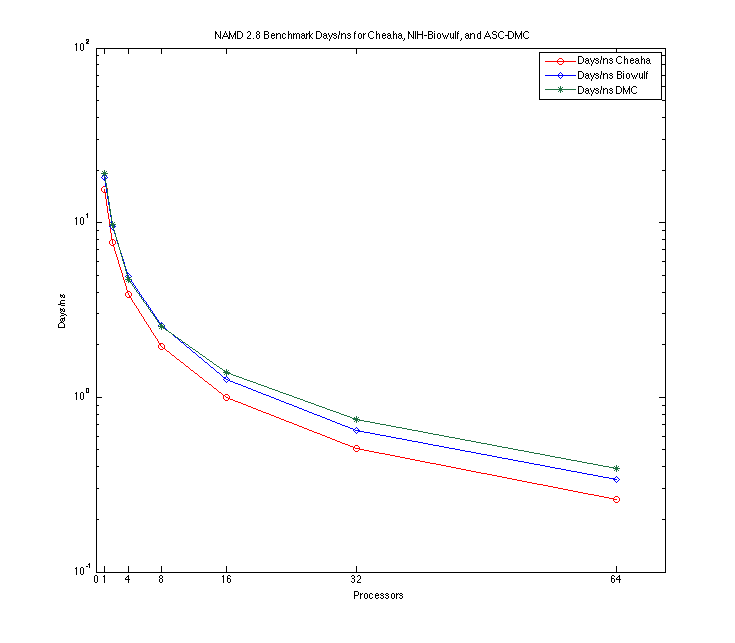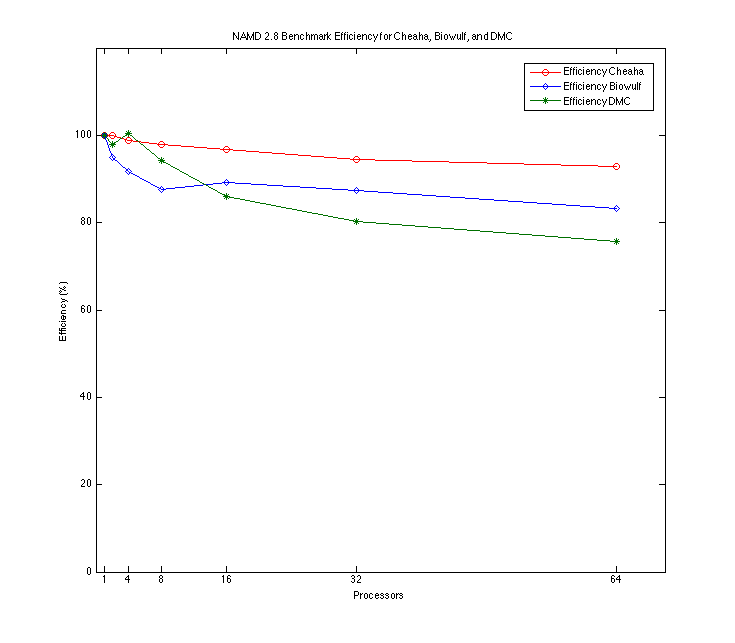NAMD Benchmarks: Difference between revisions
(Created page with "Page under construction!!") |
(First half of the benchmark page) |
||
| Line 1: | Line 1: | ||
The efficiency of a parallel system describes the fraction of the time that is being used by the processors for a given computation. It is defined as | |||
<pre> | |||
Execution time using one processor ts | |||
E(n)= -------------------------------------- = ---- | |||
N * Execution time using N processors N tn | |||
</pre> | |||
In general, parallel jobs should scale to at least 70% efficiency. The ASC's DMC recommends a scaling efficiency of 75% or greater. For NAMD the efficiency of a parallel job can be calculated as follows (where N is processors committed to the job): | |||
<pre> | |||
days/ns where N = 1 | |||
--------------------- * 100 = Efficiency | |||
N * days/ns | |||
</pre> | |||
Information on NAMD performance Scaling is available at: http://www.ks.uiuc.edu/Research/namd/wiki/?NamdPerformanceTuning | |||
Benchmark used for performance evaluation on the [[Cheaha]], [http://biowulf.nih.gov Biowulf], and [http://www.asc.edu/supercomputing/index.shtml DMC] is Apoa1 from the NAMD suite and is available at: http://www.ks.uiuc.edu/Research/namd/utilities/ | |||
The parameters for the benchmark used through out are: 500 steps, 92K atoms, 12A cutoff + PME every 4 steps. | |||
== Sample Benchmark using NAMD == | |||
===Sample Benchmark comparing Days/ns for Cheaha, Biowulf, and DMC using InfiniBand=== | |||
{| border="1" align="center" cellpadding="10" style="text-align:center;" | |||
|+ Days/ns (efficiency) on Cheaha, Biowulf, and DMC | |||
!Processors | |||
! Cheaha | |||
! Biowulf | |||
! DMC | |||
|- | |||
|1 | |||
|15.4054 (100%) | |||
|18.0535 (100%) | |||
|19.1000 (100%) | |||
|- | |||
|2 | |||
|7.7119 (99.87%) | |||
|9.5163 (94.86%) | |||
|9.7600 (97.84%) | |||
|- | |||
|4 | |||
|3.8933 (98.92%) | |||
|4.9222 (91.69%) | |||
|4.7570 (100.3%)* | |||
|- | |||
|8 | |||
|1.9653 (97.98%) | |||
|2.5763 (87.59%) | |||
|2.5360 (94.14%) | |||
|- | |||
|16 | |||
|0.9950 (96.76%) | |||
|1.2658 (89.14%) | |||
|1.3870 (86.06%) | |||
|- | |||
|32 | |||
|0.5101 (94.37%) | |||
|0.6463 (87.29%) | |||
|0.7438 (80.24%) | |||
|- | |||
|64 | |||
|0.2592 (92.83%) | |||
|0.3390 (83.22%) | |||
|0.3938 (75.78%) | |||
|- | |||
|128 | |||
|0.1360 (88.45%) | |||
|NA | |||
|NA | |||
|- | |||
|256 | |||
|0.0770 (78.09%) | |||
|NA | |||
|NA | |||
|} | |||
[[File:NAMD_benchmark_img1_Days_cheaha_dmc_biowulf.png|center]] | |||
[[File:NAMD_benchmark_img2_Efficiency_cheaha_dmc_biowulf.png|center]] | |||
===Bench mark notes=== | |||
The above benchmarks were run using NAMD 2.8b1 and the [http://www.ks.uiuc.edu/Research/namd/utilities/ Apoa1 benchmark suite] from NAMD. | |||
On Cheaha, only the third generation hardware was used for the above benchmarks. More information about the hardware used on [[Cheaha]] is available [[Cheaha#Hardware |here]]. | |||
The data for the NIH-Biowulf benchmarks is available at: http://biowulf.nih.gov/apps/namd/namd_bench.html. The Biowulf hardware used for comparison in the e2800 with Infiniband. | |||
== Comparison of Ethernet and IB == | |||
== Comparison on different nodes on Cheaha Gen 2 and Gen 3 with IB == | |||
== Actual job benchmarks (Segrest job) == | |||
== Perform Your Own Benchmarks == | |||
Revision as of 15:42, 26 May 2011
The efficiency of a parallel system describes the fraction of the time that is being used by the processors for a given computation. It is defined as
Execution time using one processor ts
E(n)= -------------------------------------- = ----
N * Execution time using N processors N tn
In general, parallel jobs should scale to at least 70% efficiency. The ASC's DMC recommends a scaling efficiency of 75% or greater. For NAMD the efficiency of a parallel job can be calculated as follows (where N is processors committed to the job):
days/ns where N = 1
--------------------- * 100 = Efficiency
N * days/ns
Information on NAMD performance Scaling is available at: http://www.ks.uiuc.edu/Research/namd/wiki/?NamdPerformanceTuning
Benchmark used for performance evaluation on the Cheaha, Biowulf, and DMC is Apoa1 from the NAMD suite and is available at: http://www.ks.uiuc.edu/Research/namd/utilities/
The parameters for the benchmark used through out are: 500 steps, 92K atoms, 12A cutoff + PME every 4 steps.
Sample Benchmark using NAMD
Sample Benchmark comparing Days/ns for Cheaha, Biowulf, and DMC using InfiniBand
| Processors | Cheaha | Biowulf | DMC |
|---|---|---|---|
| 1 | 15.4054 (100%) | 18.0535 (100%) | 19.1000 (100%) |
| 2 | 7.7119 (99.87%) | 9.5163 (94.86%) | 9.7600 (97.84%) |
| 4 | 3.8933 (98.92%) | 4.9222 (91.69%) | 4.7570 (100.3%)* |
| 8 | 1.9653 (97.98%) | 2.5763 (87.59%) | 2.5360 (94.14%) |
| 16 | 0.9950 (96.76%) | 1.2658 (89.14%) | 1.3870 (86.06%) |
| 32 | 0.5101 (94.37%) | 0.6463 (87.29%) | 0.7438 (80.24%) |
| 64 | 0.2592 (92.83%) | 0.3390 (83.22%) | 0.3938 (75.78%) |
| 128 | 0.1360 (88.45%) | NA | NA |
| 256 | 0.0770 (78.09%) | NA | NA |
Bench mark notes
The above benchmarks were run using NAMD 2.8b1 and the Apoa1 benchmark suite from NAMD.
On Cheaha, only the third generation hardware was used for the above benchmarks. More information about the hardware used on Cheaha is available here.
The data for the NIH-Biowulf benchmarks is available at: http://biowulf.nih.gov/apps/namd/namd_bench.html. The Biowulf hardware used for comparison in the e2800 with Infiniband.

